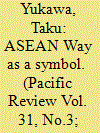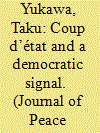| Srl | Item |
| 1 |
ID:
158635


|
|
|
|
|
| Summary/Abstract |
Has the ‘ASEAN Way’ – a set of rules of the Association of Southeast Asian Nations (ASEAN) centered on the principle of non-interference and consensus decision-making – really established its position as an ASEAN norm? This paper aims to analyze the discourses of each ASEAN country and empirically explain their attitudes toward the norm. Specifically, I review various documentations to examine how various ASEAN diplomats have used the term ‘ASEAN Way.’ How did they come to call the principle of non-interference and consensus decision-making ‘ASEAN Way’ in the early 1990s? Why have they begun using the term negatively, as something to be reformed, in recent years? By describing the discourses on the ‘ASEAN Way’ and their changes over the years, I show that the rationality of non-interference and consensus decision-making has changed over time and shifted the positioning of the ‘ASEAN way’ as a symbol. This presents a new and empirical interpretation of the changes in ASEAN Norms.
|
|
|
|
|
|
|
|
|
|
|
|
|
|
|
|
| 2 |
ID:
188999


|
|
|
|
|
| Summary/Abstract |
What connection exists between protests and coup attempts? Although recent studies have revealed that the former incites the latter, they generally do not consider international factors. We contend that post-Cold War nonviolent protests have promoted coup attempts. With sentiment in the international community turning against coups following the end of the Cold War, coup organizers have had to portray their actions as democratic. Launching a coup attempt during ongoing nonviolent protests became a convincing method to prove democratic bona fides. This is because the international community favors nonviolence, and it signals that the emerging regime will not have extreme preferences and will keep order. Conversely, the international community does not regard violent protests as legitimate, and staging a coup attempt during violent protests will not enable a military to claim legitimacy. This argument is tested through statistical analysis and by using the 2011 Egyptian coup as a case study. As expected, the results indicate that the impact of protests on coup attempts varies depending on (1) whether those protests are violent or nonviolent, and on (2) the period. Specifically, only the nonviolent protests in the post-Cold War era prompt coup attempts meaningfully.
|
|
|
|
|
|
|
|
|
|
|
|
|
|
|
|